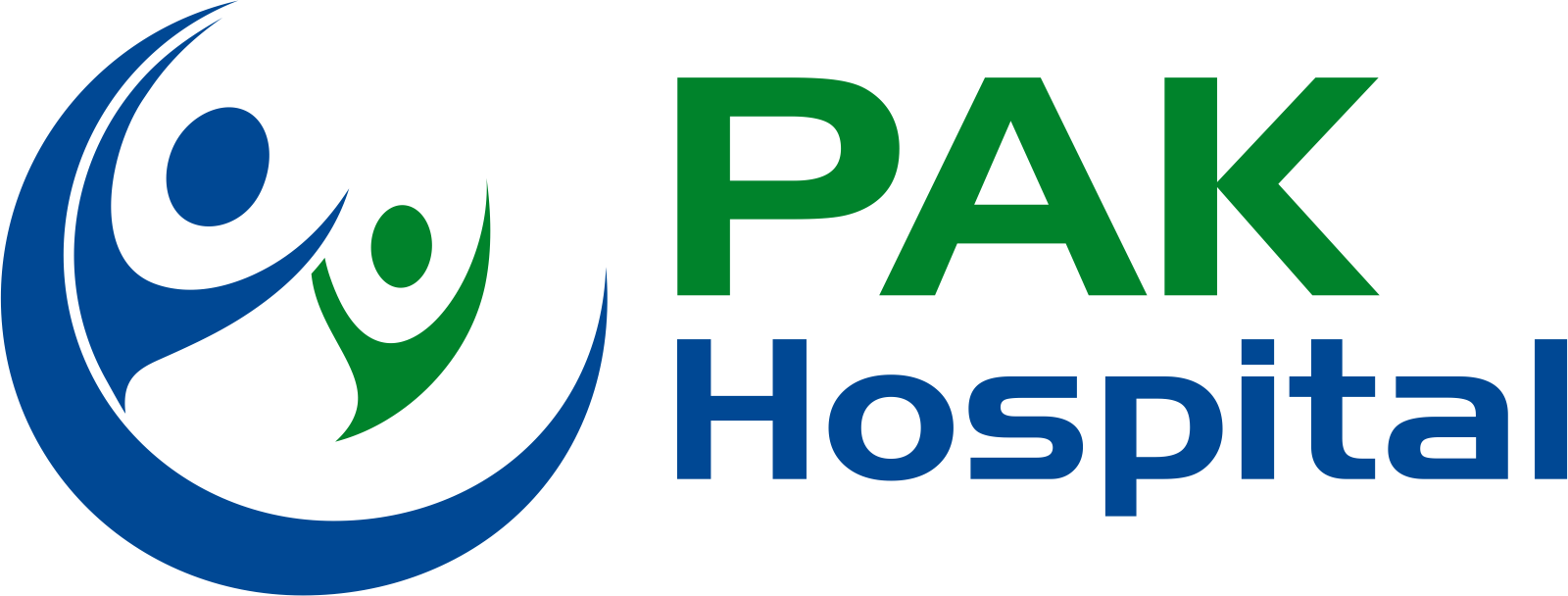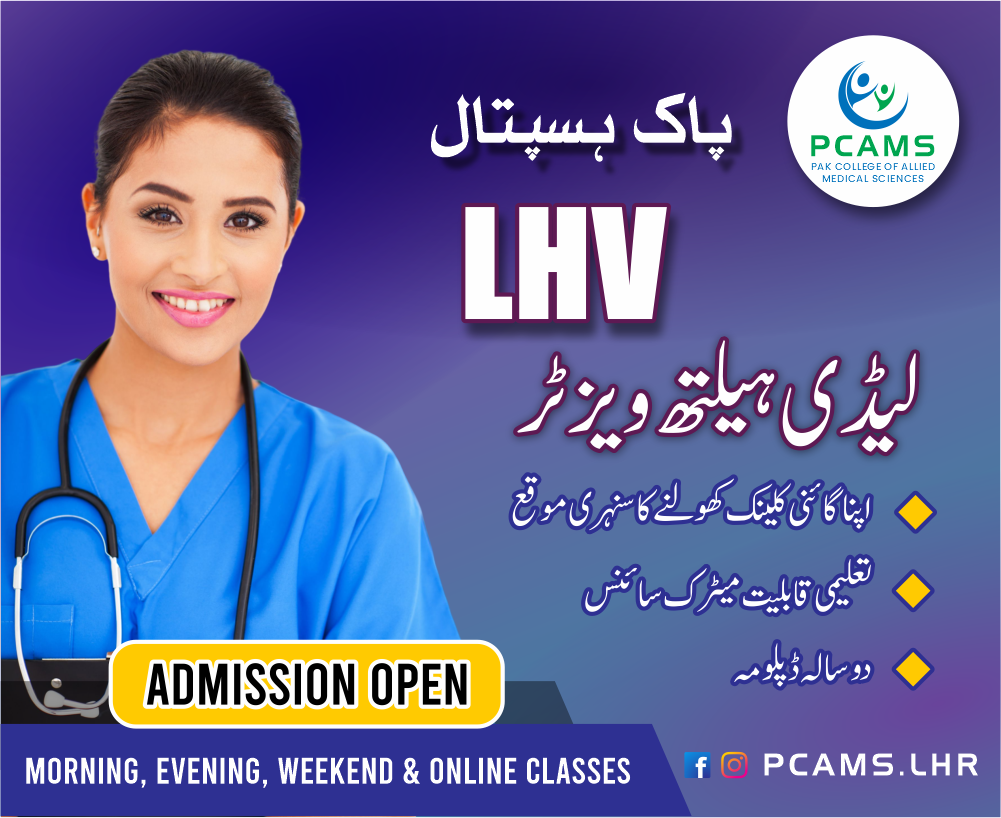Pak College of Allied Medical Sciences (PCAMS) is a registered institute and holds affiliation with the Pakistan Nursing Council. We proudly offer a comprehensive 2-year course, recognized as an equivalent qualification to FSC. With a single fee payment, enrolled students will have the opportunity to earn a CMW (Community Midwife) that is also recognized as a FSC degree.
Affiliation
The Pakistan nursing council has granted affiliation to Pak College of Allied Medical Sciences (PCAMS) for the purpose of conducting its educational program.
Benefits of a LHV (Lady Health Visitor)
The Lady Health Visitor (LHV) diploma is a valuable qualification that offers numerous benefits for individuals pursuing a career in the healthcare sector, particularly in community and maternal health. Here are some of the key benefits of obtaining an LHV diploma:
- Community Healthcare: LHVs play a vital role in providing healthcare services at the community level. They are trained to work in rural and urban areas, reaching populations that might otherwise have limited access to medical facilities.
- Maternal and Child Health: LHVs are trained to provide specialized care to pregnant women, new mothers, and infants. They assist in ensuring safe pregnancies, proper prenatal care, and postnatal care, thereby contributing to reducing maternal and infant mortality rates.
- Preventive Care: LHVs focus on preventive healthcare measures, such as immunizations, nutrition counseling, family planning, and hygiene education. This emphasis on prevention helps improve the overall health of the community and reduces the burden on hospitals.
- Health Education: LHVs educate individuals and families about various health-related topics, ranging from family planning and maternal health to child care and disease prevention. This empowers communities to make informed decisions about their health and well-being.
- Early Disease Detection: LHVs are trained to identify early signs of illnesses and diseases. Their presence in the community allows for timely detection and intervention, which can lead to better health outcomes and reduced healthcare costs.
- Promotion of Safe Practices: LHVs educate communities about safe practices, such as proper sanitation, clean water consumption, and safe food handling. This contributes to the prevention of waterborne diseases and other health risks.
- Cultural Sensitivity: LHVs are often from the same communities they serve, which enhances cultural understanding and sensitivity in healthcare delivery. This can lead to better rapport with patients and improved adherence to medical advice.
- Referral and Advocacy: LHVs are trained to recognize when medical cases require higher levels of care. They can refer patients to hospitals or specialized clinics when necessary, ensuring that individuals receive appropriate treatment in a timely manner.
- Personal Fulfillment: Working as an LHV can be deeply rewarding as you contribute to improving the health and well-being of your community. The positive impact you make on individuals’ lives can bring a sense of purpose and satisfaction.
- Skill Development: The LHV diploma program equips individuals with practical skills such as conducting health assessments, administering vaccines, providing prenatal and postnatal care, and conducting health education sessions. These skills are valuable and transferable within the healthcare sector.
- Contribution to Public Health: LHVs are an integral part of the public health system. By providing essential healthcare services and education, they contribute to the overall improvement of public health indicators and the well-being of communities.
LHV Career Opportunities
Lady Health Visitors (LHVs) have diverse job opportunities within the healthcare sector, especially in the field of maternal and child health, community health, and preventive care. Here are some of the job opportunities available to individuals with an LHV qualification:
- Community Health Centers: LHVs often work in community health centers, providing essential healthcare services to the local population. They conduct health assessments, offer family planning advice, provide immunizations, and deliver health education sessions.
- Maternal and Child Health Programs: LHVs play a crucial role in maternal and child health programs, ensuring safe pregnancies, assisting with deliveries, and offering postnatal care. They educate mothers on breastfeeding, nutrition, and infant care.
- Government Health Departments: Many governments employ LHVs as part of their public health initiatives. LHVs work in collaboration with health departments to deliver healthcare services, conduct health campaigns, and promote preventive care.
- Non-Governmental Organizations (NGOs): Numerous NGOs hire LHVs to work on healthcare projects targeting underserved communities. They might be involved in initiatives related to reproductive health, hygiene education, disease prevention, and more.
- Rural Health Posts: In rural and remote areas, LHVs often staff health posts where they provide basic healthcare services, health education, and support for women and children.
- Primary Health Care Centers: LHVs are often stationed at primary healthcare centers, where they offer a range of services, including antenatal and postnatal care, family planning counseling, immunizations, and health screenings.
- School Health Programs: LHVs can also work in schools to provide health education, conduct health check-ups for students, and promote healthy behaviors among young people.
- Health Education and Promotion: LHVs are involved in health education and promotion efforts, conducting sessions on topics such as hygiene, nutrition, family planning, and disease prevention in community settings.
- Referral Services: LHVs may work as a bridge between the community and higher-level healthcare facilities, referring individuals to hospitals or specialists when more advanced care is needed.
- Research and Data Collection: Some LHVs are involved in research projects or data collection initiatives related to public health. They might gather data on health indicators, assist in epidemiological studies, or contribute to health research.
- Home Visits and Outreach: LHVs often conduct home visits to assess health conditions, offer advice on healthy practices, and monitor the well-being of mothers and children in their communities.
- Private Clinics and Hospitals: While less common, LHVs might also find employment opportunities in private clinics or hospitals that focus on maternal and child health services.
Eligibility Criteria
- Matric with science subjects
- Minimum 45 % Marks
- No age limit
Documents Required
- Matric (Science) Degree / Result Card
- 8 Passport size pictures
- CNIC / B-Form
- Domicile

